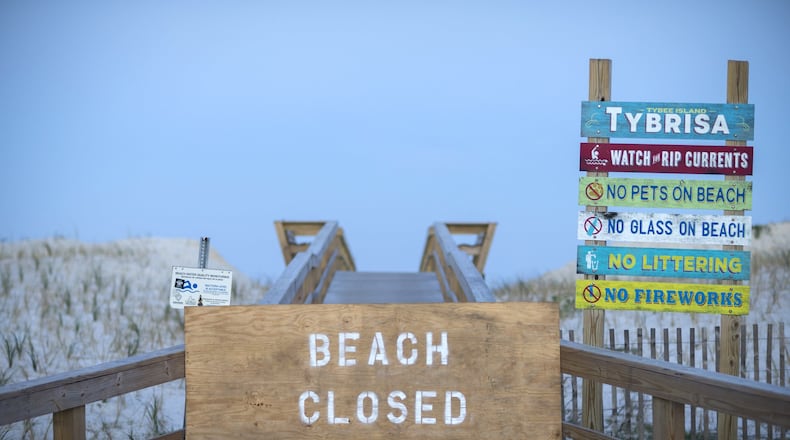An urgent plea by Tybee Island's mayor to reconsider a state order reopening the beaches. A message from a Republican legislator siding with local officials over Gov. Brian Kemp. And an irate city official said Kemp could "come lock me up" for opposing the decision.
Tybee Island officials were among the most outspoken critics of Kemp's decision to lift local restrictions that shuttered the town's seashore. And records show a vigorous behind-the-scenes campaign urging him to change his mind.
Mayor Shirley Sessions warned the governor in an April 3 email shortly before his statewide mandate took effect that reopening the beaches would deal a "devastating blow" to safety efforts from the town of roughly 3,000 people.
“With Jekyll Island, South Carolina, North Carolina and Florida beaches closed, the influx of residents and visitors on our 2.5 mile beach will create a severe health crisis, and chaos in trying to maintain social distancing,” she wrote Kemp.
“No one wants to walk on the beach more than I, however I firmly believe it is a small sacrifice to pay in the long run to help conquer this COVID-19 enemy.”
Other local officials joined Sessions in opposing Kemp’s decision. State Rep. Jesse Petrea, whose district includes the island, wrote to Kemp’s office that he sided with local officials during this “exceptional time.”
The governor and his allies cast the decision as an incremental step to give Georgians more access to the outdoors while promising that officers would scour the seashore to enforce social distancing and restrict the use of chairs, umbrellas and tents.
‘Come lock me up!’
The emails were obtained by the AJC through American Oversight, a watchdog group that filed a transparency request with local officials for the records.
They are a snapshot of the fierce opposition Kemp faced over the last month after he imposed a statewide shelter in place that took precedence over local restrictions.
Commission chairs from a dozen north Georgia counties pleaded with Kemp to seal off state parks. Local governments that had more drastic measures in place fumed that their restrictions were relaxed.
And mayors across the state opposed his order last week to let restaurants, barber shops and other businesses resume operations with safety measures.
The emails to Tybee officials show that Kemp’s aides tried to defuse the criticism. Candice Broce, the governor’s chief spokeswoman and deputy executive counsel, wrote local officials about an hour before the order took effect promising increased state patrols on beaches, parking lots and nearby highways.
“We understand your position and hope to continue working closely together on keeping Georgians safe as we fight COVID-19,” she wrote in an one note. “At this time, we are asking Tybee Island leaders to comply with the terms of the executive order. The beaches are now open.”
That drew a stinging response from City Council Member John Branigin: “Please tell Governor Kemp he can come lock me up!”
Branigin said late Tuesday he sent the email in response to what he felt was an “extremely condescending” dispatch from Broce.
“It was an agonizing decision to close the beaches and to have the governor come along and neuter our restriction was infuriating,” he said. “To me, Georgia is supposed to be a home rule state and the powers that be were forgetting that. I was lashing out. It just set me off.”
Credit: Stephen B. Morton
Credit: Stephen B. Morton
‘I accept’
Broce declined to comment on Branigin’s email but described the reopening as a success, saying that Department of Natural Resources officers issued 551 warnings but no misdemeanor or felony citations on beaches.
“Officers have worked tirelessly to ensure people understand the parameters of the executive orders and, as you can see, any non-compliance has been readily rectified following verbal warnings,” said Broce.
In an interview, Sessions said she remains opposed to the governor’s decision and is concerned about a spike in traffic on Saturday to the seaside island just outside of Savannah.
About 7,000 visitors crossed the bridge leading to the island on Saturday, nearly doubling previous traffic, and she said many were “not respecting the governor’s orders.”
Still, she said, she’s come to accept that Kemp’s order will remain in place despite her objections. Council members met in a virtual retreat Tuesday to discuss next steps, including whether to reopen parking lots as larger crowds head to the island.
“It’s about accepting what you can’t control and focusing on what you can,” said Sessions.
“When it first happened, the word ‘devastated’ was fair. We had taken such pains over the previous weeks to do what the governor told us,” the mayor added, referring to the governor’s initial stance letting local leaders take more restrictive measures.
“I still disagree, but I accept what we’re faced with. And, rather than fighting it, I’m trying to see how we can make it work for our community without being belligerent or argumentative to the governor.”
About the Author
The Latest
Featured





